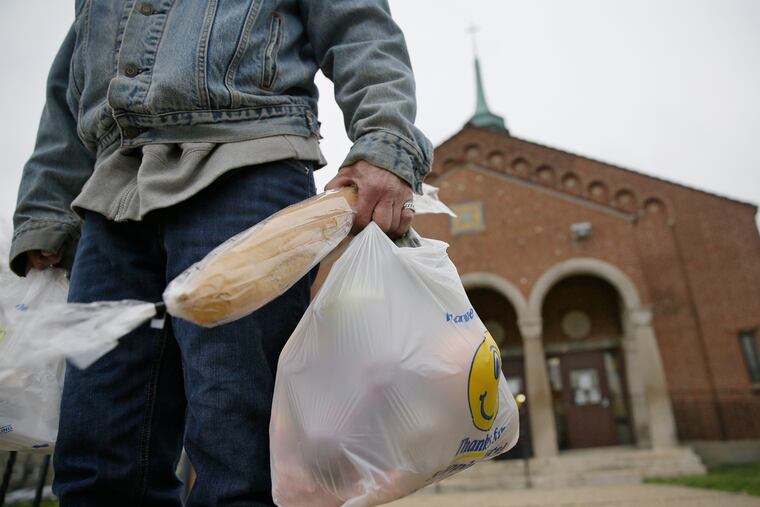Coronavirus reveals just how skimpy the health care safety net is l Opinion
It is time to have real discussions not about how to cut programs, but about how to develop creative solutions to the flaws this crisis has exposed.

As a public service, The Inquirer is making this article and other critical public health and safety coverage of the coronavirus available to all readers.
As the novel coronavirus spreads nationwide and in the Commonwealth, enormous flaws in our healthcare system — and the larger system of programs and benefits that protect families and individuals from disaster — have been exposed. We are now undoubtedly facing the largest public health crisis of our lifetime and the social safety net is being tested like never before.
As this crisis ramps up, we’ve heard from people who are worried about the possible astronomical costs of testing and treatment for COVID-19. We’ve heard from people worried that they don’t have health coverage or that their health coverage is inadequate, despite the coverage gains we’ve made over the last 10 years. We’ve heard from people worried that they can’t take sick leave.
Gov. Wolf has rightly ordered many Pennsylvania businesses to shut down or alter their operations. While this is the only option to slow the spread of the virus, it has also meant lay-offs, reductions in hours, loss of health coverage, and more. Since the order, our helpline has been flooded by people worried about paying for groceries, bills, housing, and healthcare premiums, among other things.
We’ve received frightened calls from high-risk seniors wondering how to get groceries when online services don’t accept their food benefits, people worried about how they can pay for longer-term supplies of their prescriptions, people worried about how to even get to a hospital for testing or treatment without owning a car, people worried about how to provide food for their children who normally get breakfast and lunch at school, and many more.
Moreover, this crisis has brought attention to how perilously close many Americans are to financial crisis. A 2016 Federal Reserve study found that 44% of U.S. households cannot pay an emergency expense of $400 or more without borrowing or selling some of their possessions. How will they weather a lay-off or reduction in wages? How would they manage an astronomical medical bill — perhaps a surprise medical bill — as a result of an extended hospitalization with coronavirus?
Put simply, each one of these questions represents a significant policy failure. These failures have left elected officials at the local, state, and federal levels scrambling to fill in the gaps that could have been closed long ago.
And they’ve left families and individuals throughout our state unnecessarily vulnerable to this pandemic. While the coronavirus’ direct impact will sicken people regardless of their socioeconomic status, many families and individuals who were already struggling to make ends meet will be disproportionately impacted by the economic disruption it will cause. Individual donors — as well as the philanthropic community — have stepped up to fill in the short-term gaps, but this crisis will be bigger than what one-time funding can possibly address.
Programs like Medicaid, SNAP (also known as food stamps), and the Low Income Home Energy Assistance Program (LIHEAP) have been a lifeline for many Pennsylvanians for decades. These programs are there to help families get back on their feet in a time of crisis, as well as to support them in their daily lives. They support our schools, nursing homes, and hospitals. They help our seniors, kids, people with disabilities, and families. The social safety net is, in fact, intertwined in the daily fabric of our lives, and the coronavirus crisis will make it more visible than ever.
We have been advocating for years to improve and strengthen our safety net. Meanwhile, much of the debate over the past four years in both Harrisburg and Washington, D.C., has revolved around making cuts to programs that will prove crucial in this crisis. Lawmakers have sought to implement work requirements for critical programs like Medicaid and food stamps, gut cash assistance programs like General Assistance, and repeal the Affordable Care Act, among others.
The coronavirus pandemic has taught us that personal health is inescapably intertwined with the health of our communities and communities nationwide. After the initial response to this crisis, lawmakers should get to the hard work of repairing our safety net. It is time to have real discussions not about how to cut programs, but about how to develop creative solutions to the flaws this crisis has exposed and how to help families and individuals stay healthy and attain financial stability, now and in the future. Many more of us will find ourselves relying on the safety net in these difficult times.
Antoinette Kraus is director of the Pennsylvania Health Access Network, the state’s largest statewide health coalition, and is a member of The Inquirer’s Health Advisory Panel.